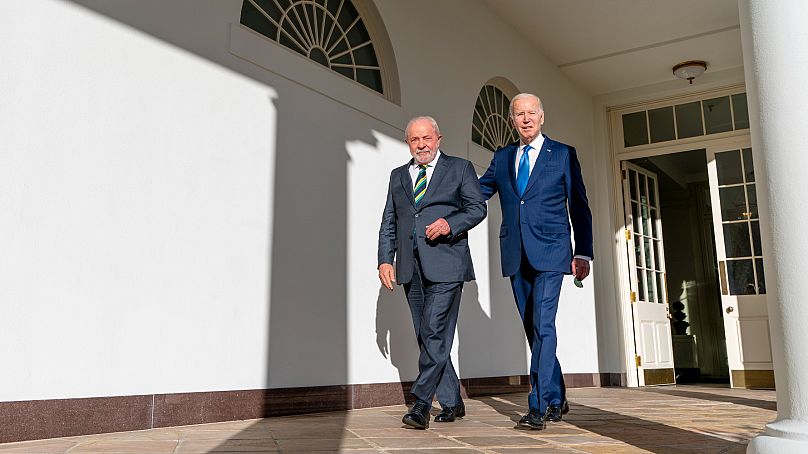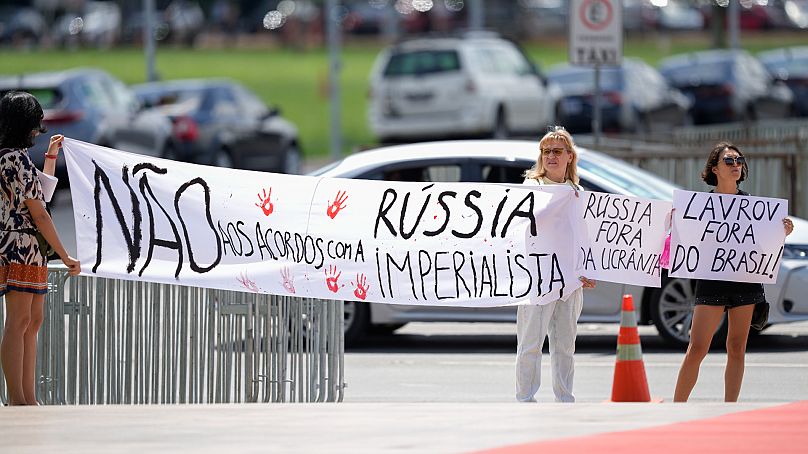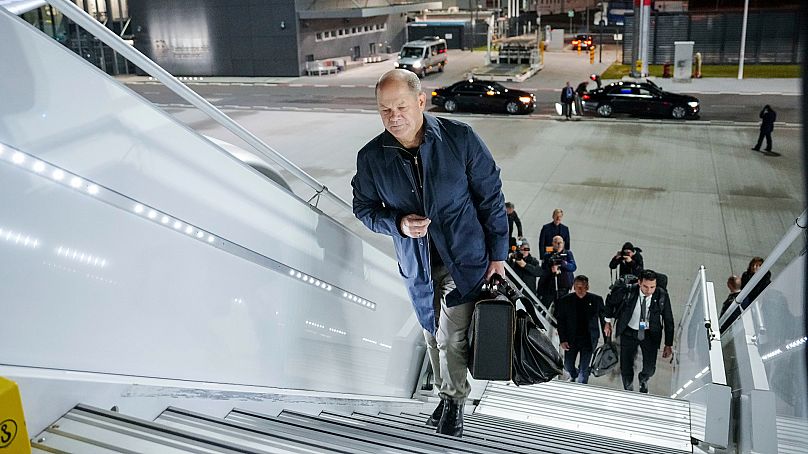Is the West falling out of love with Brazil’s Lula after his controversial comments on the war in Ukraine? Euronews asked the experts to find out.
When Brazil elected Luiz Inácio Lula da Silva as president for the second time in October, much of the West looked on in relief and hoped that it would end a period of populism ushered in by his predecessor Jair Bolsonaro.
 ADVERTISEMENT
ADVERTISEMENT
 ADVERTISEMENT
ADVERTISEMENT
But in the last six months, Lula has made waves on the international stage, particularly when it comes to his comments on the war in Ukraine. So, could Lula's foreign policy put him at odds with Europe, just months after taking office?
“Lula won the election last year …. [and] most people celebrated his victory,” Christopher Sabatini, a senior research Fellow for Latin America at Chatham House, told Euronews. “The international perception has since changed largely because Lula's now engaging in a very aggressive international campaign based on long-standing views of the world.
"And that view is primarily to try to create a multipolar world and have Brazil serve as a spokesperson, as a voice for the Global South, which includes China and Russia in many ways.”
Lula's controversial comments
Lula sparked controversy in the West after suggesting that Ukraine’s allies were prolonging the war because they are providing Kyiv with weapons and support.
"The United States needs to stop encouraging war and start talking about peace; the European Union needs to start talking about peace so that we can convince Putin and Zelenskyy that peace is in the interest of everyone and that war is only interesting, for now, to the two of them," Lula told reporters during a recent trip to China.
The White House immediately pushed back, saying Lula was “parroting Russian and Chinese propaganda, without looking at the facts.”
Brazil’s president has since condemned the violation of Ukraine's territorial integrity and maintained calls for peace negotiations.
This was not the first time that Lula defied the foreign policy consensus of his Western allies. In January, he said that Kyiv and Moscow are both to blame for Russia's full-scale invasion of Ukraine.
He has also refused to sign a United Nations declaration criticising Nicaragua’s human rights abuses, allowed two Iranian warships to dock in his country's territory and has not sent weapons to Ukraine.
Last week, he also called for BRICS nations – Brazil, Russia, India, China, and South Africa - to replace the dollar with another currency for international trade.
These moves, according to Sabatini, could ruffle feathers and force the West to reevaluate Brazil's position: "To many people in Western Europe and in the US, who before thought that Lula's engagement with the Global South was rather a value-neutral, it now looks like it actually may be undermining some of the key values of the developed north."
Can Brazil influence the war in Ukraine?
After Lula's initial comments and his calls for peace negotiations, Kyiv invited the Brazilian president to come to Ukraine so that he could "understand the real causes and essence of Russian aggression."
Oleg Nikolenko, a spokesperson for the Ukrainian foreign ministry also said that Lula's comments put "the victim and the aggressor on the same scale."
This response, according to Fredrik Erixon, the director of the European Centre for International Political Economy, is one of the reasons why Brasilia doesn't have much power in the war in Ukraine, despite Lula's efforts to start peace talks.
"I think it's perfectly obvious to Europe that Ukraine doesn't believe in it. And Ukraine doesn't believe that Lula is going to be an honest broker who can establish some sort of an accord that can help to drive parties towards peace," he said.
"It's Ukraine who's going to negotiate this particular peace."
Sabatini also questioned whether Brazil had the influence to encourage peace talks. "Brazil's sort of 'foreign policy DNA' very much believes in the importance of dialogue and that it can serve as a broker negotiator.
"But in terms of raw power, it really doesn't have much."
Major trade deal in the works
But it's not all bad news for Brazil's relations with the West. The European Union is reportedly in the final stages of securing its Mercosur trade deal with Brazil and its neighbours, Argentina, Brazil, Paraguay and Uruguay.
If signed, the deal would give agriculture producers from the South American trade block better access to the European Union and in return it would give manufacturers in the EU more export opportunities. After China, the European Union is Mercosur's largest trade partner.
The Mercosur trade deal is also one of the reasons why it is unlikely, “that Europe is trying to devise a particular response to [Lula's foreign policy],” according to Erixon.
Initial negotiations for the deal began 23 years ago but it stalled because of concerns - which both the EU and Lula have taken steps to alleviate - about the survival of the Amazon rainforest.
"Europe really wants to get to a point where they can finalise both a trade agreement and the sort of broader economic partnership agreement with Mercosur," he said.
And it is currently in a position to see it through. That is because Sweden holds the rotating presidency of the Council of Europe, and according to Erixon, "Sweden tends to be favourable towards more trade.
"And Sweden is going to be followed by Spain, which has also been pushing very hard for the finalisation of this agreement because, for geographic as well as cultural reasons, it believes that this is an important [deal] and they stand to benefit from it.
"So the stars were aligned, at least on the European side, to resolve the problems that remained in this trade agreement."
RELATED: Around two-thirds of the global population lives in countries that have not condemned Moscow for its full-scale invasion of Ukraine. Read this article to find out more about the Global South's position on the war in Ukraine.













